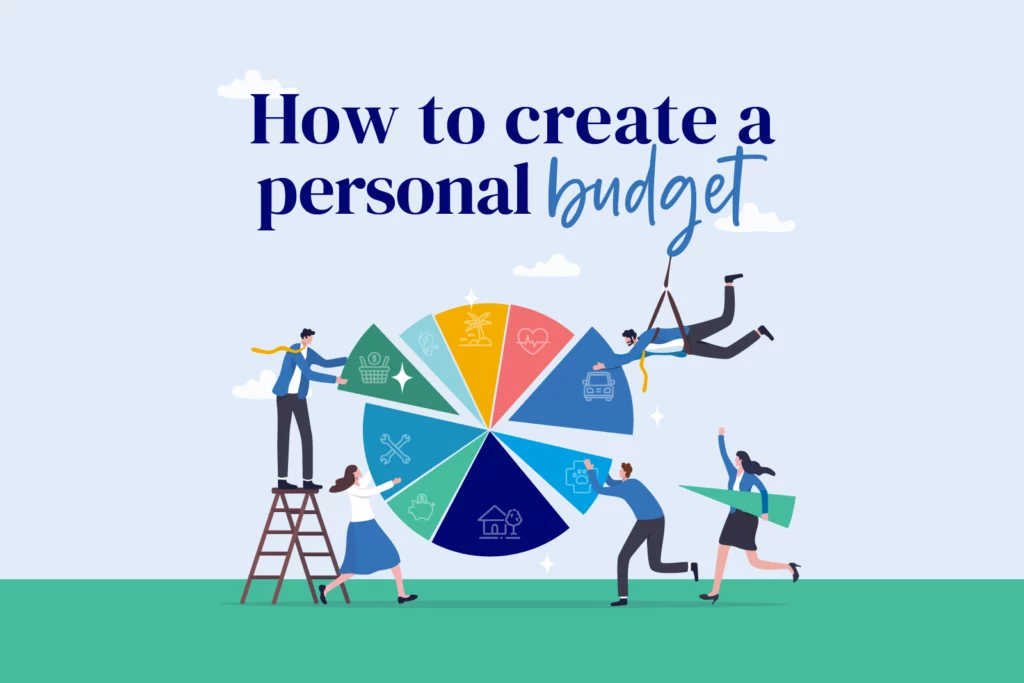How to save money in Australia: our ultimate guide
Are you struggling to save money and break free from living paycheck-to-paycheck? Learn how to build a solid savings plan and take control of your spending habits with a smart budget that keeps you on track so you can achieve your financial goals with confidence.
What is saving, and how can budgeting help you build wealth?
Saving money isn’t just about hoping there’s something left at the end of the month, it’s about having a clear plan for your money so you’re not constantly playing catch-up. Without a solid approach, unexpected costs can throw life into chaos. and suddenly, you’re relying on credit cards, loans, or borrowing money from friends or family. The reality? Living paycheck to paycheck isn’t just stressful, it’s exhausting.
In this guide, we’ll teach you how to save money effectively, reduce expenses, and create a budget plan that works for you. Whether you want to lower household bills, track your spending more efficiently, or grow your savings accounts, we have practical, easy-to-follow advice to help you take control of your financial situation and reach your money goals.
Steps to save money and why having a budget is the way to reach your financial goals
If unexpected expenses keep throwing your finances off track, it’s time to create a solid budget that helps you stay in control. A well-planned budget not only covers essential costs but also sets you up to build savings and reach your financial goals with confidence.
Create a budget that actually works by helping you achieve your savings goals
A budget that works, will align your income with your expenses while helping you achieve your financial goals faster.

Here are 4 easy steps to set up a budget:
- first, download MyBudget’s free Personal Budget Template: this will give you everything you need to get started
- list all your income sources: this includes your salary, side gigs, government benefits, or any other money coming in. Having a clear understanding of your total income is the foundation of your budget
- track your expenses and categorise them: break them into fixed costs (rent, utilities, loan repayments) and variable expenses (groceries, entertainment, transport). Be honest about your spending habits, even those daily coffees or impulse buys
- review and adjust regularly: your budget isn’t a set-and-forget plan. Check in regularly to see where you can save, maybe cutting back on non-essentials or reallocating funds to your savings goals. Small tweaks can make a big difference over time.
Even if you start by saving just a little each month, consistency is key. Over time, those savings can really add up.
Looking for a more in-depth guide on how to budget? Check out our step-by-step breakdown on how to create a personal budget.
How to automate your savings and grow your money effortlessly
Set up an automatic transfer that moves money into your savings account before you even see it. It’s like a set-and-forget savings hack, no willpower needed. Since it happens in the background, you won’t even miss the money, but down the track, you’ll check your balance and be pleasantly surprised. This simple finance habit keeps you on track with your money goals while building a financial buffer for the unexpected.
Find the best high-interest savings accounts to grow your money faster
Separating your savings from your everyday bank accounts is a smart move, it keeps you from dipping into your funds when temptation strikes. To make your money work harder, compare high-interest savings accounts and look for competitive interest rates. Many banks offer bonus rates if you deposit regularly and avoid withdrawals, so read the fine print. Don’t just stick with the big banks, check online comparison sites and customer reviews to find the best savings accounts in Australia.
Meal planning: reduce your grocery bill and cut food waste
Canstar’s latest research shows the average Aussie household spends nearly $10,000 a year on groceries. A well-structured meal plan helps cut grocery costs, reduce food waste, and stop last-minute takeaway splurges. Need help? Download our Healthy Meals on a Budget Guide for meal plans, recipes, and shopping lists.
Top 5 ways to save money on groceries and cut your food bills
You might be spending way more on groceries than you need to. Here’s how to cut your supermarket bill and keep more cash in your pocket:
- buying seasonal produce to cut costs and get the best quality food
- swapping expensive name brands for home brands without sacrificing taste
- reducing food waste by properly storing fresh food and using leftovers creatively
- shopping smarter by sticking to a grocery list and avoiding impulse buys
- using loyalty programs and accessing discounts where possible.
Want more ways to save at the supermarket? Check out our full guide on how to save money on groceries.
Save money on coffee: make barista-style espresso at home
Aussies love their coffee! The folks at BeanScene report that at an average of $4.80 per latte, that daily barrista brewed coffee habit could be costing you around $1,747 a year. Ouch! Did you know, Aldi’s award-winning Lazzio coffee beans cost just $8.49 per 500g, and when paired with a $10 Kmart coffee plunger, you can make barista-quality espresso at home or work for a fraction of the price. Switching to home brews is easier than ever and results in big savings without giving up your quality caffeine fix.
Reduce your household bills: Tammy Barton’s expert tips to cut costs

Tammy Barton, founder of MyBudget, shares her top three tips to reduce your bills and grow your savings:
1. negotiate better rates on energy and insurance: loyalty doesn’t always pay when it comes to bills. Call your provider, ask for a better deal, and compare other options. Many companies will match or beat competitor prices just to keep your business
2. cancel unused subscriptions and direct debits: those small monthly charges for streaming services, gym memberships, and apps can add up fast. Review your bank statements, cut what you don’t use, and redirect that money straight into your savings account
3. be smarter with your electricity use: run major appliances in off-peak times, switch to LED bulbs, and adjust your thermostat to trim your energy bills without even noticing the difference
Every dollar saved on household bills is a dollar that can go straight into your savings goals, whether that’s an emergency fund, a home deposit, or a holiday.
Are you serious about cutting even more from your household bills? Check out Tammy’s full blog filled with all her expert tips and strategies to help you reduce expenses and boost your savings: how to save on household bills.
How to cut the biggest expenses and save thousands
If you’ve already trimmed your everyday spending, it’s time to tackle the bigger costs in your household budget.
Refinance your mortgage with MyBudget Loans: lower repayments for big savings
If it’s been a while since you checked your home loan, you could be paying too much. Interest rates have just had the first cut since 2020. This makes it the perfect time to reassess your mortgage repayments. Clients refinancing with MyBudget Loans save on average $10,000 in repayments per year. A free home loan health check could help you find a lower rate and save thousands. Book a free consultation with the MyBudget Loans team.
How much will I save if I downsize or sell my car?
Owning multiple cars or a vehicle with high fuel consumption can be one of the biggest household expenses, from fuel and maintenance to insurance and registration. According to RACV’s Car Running Costs Survey, downsizing from a large SUV to a small car can save you over $5,000 annually. Downsizing or selling a second or a third vehicle could free up thousands of dollars and reduce your ongoing expenses, making a significant impact on your budget. If your second car is more of a luxury than a necessity, consider whether carpooling or public transport could help you cut costs.
How much money can you make by renting out unused space?
If you have a spare room, why not turn it into a steady source of income? Renting it out can help cover your bills, support your monthly budget, and even accelerate your savings goals. Whether it’s leasing to a long-term tenant, hosting short-term stays on platforms like Airbnb, or renting out a garage for storage, making use of unused space can be a great financial boost. Plus, if you’re saving for a house deposit or looking for extra money to put towards your financial goals, this can be a smart move. Explore your options and see how much extra cash you could be bringing in each month.
Quick ways to start saving right now
If you need a quick financial win and want to start saving money today, here are some quick and easy actions you can take immediately:
- shop online to avoid impulse buys and track your spending in real time
- cancel unused subscriptions like Netflix or Spotify and keep that cash in your pocket
- sell clutter on Marketplace or eBay for quick extra money
- challenge yourself to a no-spend month to fast-track savings
- buy second-hand from op shops for huge savings on clothing, furniture, and tech
- ditch credit cards and focus on paying off debt faster.
Want to see how small savings add up? Use the MyBudget Savings Calculator to set your goals and track your progress.
How much do I need in my emergency fund?
A good rule of thumb is to have at least three to six months’ worth of living expenses set aside for emergencies, and the best way to achieve this is through a well-structured budget that prioritises savings. By budgeting effectively, you can consistently set aside money, ensuring you have a financial cushion to cover unexpected costs like medical emergencies, car repairs, or sudden job loss, without relying on credit cards or loans.
Not sure how to start building your emergency fund? Here are some simple ways to grow your savings fast:
- selling unwanted items online
- using your tax return for savings instead of splurging
- taking on a side hustle like dog walking or lawn mowing.
If you’re ready to take your savings to the next level and want a strategy that helps keep you on track, MyBudget is here to help.
How can MyBudget help me save money?
MyBudget has been helping Australians for over 25 years, guiding more than 130,000 people to financial success. Here’s how we can help you save more and stress less:
✅ tailored budget plans to help you stay on track
✅ automated bill payments to avoid late fees and overspending
✅ debt management strategies to help pay off loans faster
✅ savings strategies designed to build long-term wealth
✅ expert support from real people available when you need it most.
Join thousands of Aussies who have transformed their financial future with MyBudget!
Book your free appointment or give us a call today on 1300 300 922.
